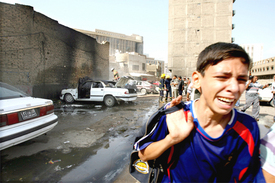
U.S. war unleashed ‘humanitarian emergency’
A new study by U.S. and Iraqi public health doctors estimates that approximately 600,000 Iraqis have been killed in the violence that the U.S. unleashed with its March 2003 invasion. An additional estimated 55,000 deaths from nonviolent causes suggest deteriorating health conditions and care, the study says. It “constitutes a humanitarian emergency,” the authors say.
The study, a collaboration between doctors at the John Hopkins University Bloomberg School of Public Health and the School of Medicine at Al Mustansiriya University in Baghdad, was conducted between May and July this year. The door-to-door survey of households in 16 of Iraq’s 18 provinces was carried out by Iraqi doctors, at great personal risk.
The study’s findings were published Oct. 11 in the British medical journal The Lancet. A full report, “The Human Cost of the War in Iraq,” is available on the web site of the MIT Center for International Studies, which supported the project.
Since 2003, Iraqi death rates have climbed steadily year by year, the report finds. The widely acknowledged death rate before the invasion was 5.5 per 1,000, and deaths were almost entirely nonviolent. In the 12 months from June 2005 to June 2006, the death rate jumped to 19.8 — about one in five — with more than half of the deaths violent. This year a smaller percentage of the deaths are attributed directly to occupation military forces than in previous years, and a bigger percentage to car bombings, but for all causes the numbers continue to mount.
In addition, the report notes in an appendix, at the time of the U.S. invasion Iraqi health conditions were still suffering the impact of the 1991 Gulf War and years of sanctions. Says the report, “The 2003 Iraq War resulted in further destruction of vital infrastructures for food, water, security and sanitation.” It cites recent estimates that of the 34,000 Iraqi doctors present in 2003, 12,000 have emigrated and 2,000 have been murdered. It also notes that U.S. reconstruction of health facilities has largely failed.
“Iraqis are dying like fish in a poisoned lake. They are insignificant lives and the numbers of the research just proves that,” Baghdad resident Muhammad Jaboury told the UN news agency IRIN.
The estimated 655,000 excess deaths since the invasion mean that an additional 2.5 percent of Iraq’s population has died above what would have occurred without the war, the report says. Interviewed by the Christian Science Monitor, Richard Garfield, a public health professor at Columbia University who works with some of the report’s authors, said he felt this was the most striking result of the survey: “You can compare that to the [U.S.] Civil War, our bloodiest war, in which 1.4 percent of our people died and look at what that meant to the U.S. Like then, what these numbers are saying is that every family is being touched.”
President Bush and some others dismissed the Lancet report. But the authors note that, regardless of numbers, it shows the same trend as the Pentagon’s own figures as well as those of the widely cited Iraq Body Count — soaring death rates since the U.S. invasion.
Iraq Body Count and some other tallies use only deaths reported in the news media. The Lancet/Johns Hopkins/Mustansiriya study used methods that are considered standard for evaluating conflict situations. The same methods have been used by the U.S. and other governments and by the UN in the Congo, Kosovo and Darfur, among others. In the Iraq survey, 92 percent of the reported deaths were confirmed by death certificates.
An Iraqi blogger, Zeyad at “Healing Iraq,” commented that efforts to discredit these numbers have little meaning for Iraqis grappling with the massive deaths resulting from the war. “The bottom line is that there is a steady increase in civilian deaths, that the health system is rapidly deteriorating, and that things are clearly not going in the right direction.”
He continued, “The people who conducted the survey should be commended for attempting to find out … On the other hand, the people who are attacking them come across as indifferent to the suffering of Iraqis, especially when they have made no obvious effort to provide a more accurate body count. In fact, it looks like they are reluctant to do this.”
The report, war critics say, shows the necessity for getting U.S. troops out and a change of course away from the Bush-made quagmire. A Detroit Free Press editorial calls for “timetables, benchmarks and plans that can be laid out to make it clear that America will not be in Iraq forever.”
“Enough about ‘staying the course’ in Iraq. The course has become an ongoing disaster for that nation and this one,” the editorial says.
According to a new CNN poll support among Americans for the war is at an all-time low. Just 34 percent of those polled say they support the war, while 64 percent say they oppose it. Women lead the opposition, with seven in 10 saying they oppose the war.












Comments